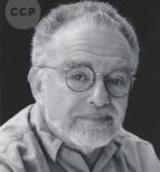Alan Trachtenberg
Neil Gray, Jr. Professor of English and Professor of American Studies
 Alan Trachtenberg, A.B., Temple University, Ph.D., The University of Minnesota, faculty member at Yale since 1969: Your exemplary scholarship and inspirational leadership have helped establish the American Studies Program at Yale as pre-eminent in the American Studies movement over the past three decades. Your general area of intellectual interest—the cultural history of the nineteenth and twentieth centuries—has remained the same throughout your career but within this area your work has shown remarkable range. From your first book on the Brooklyn Bridge, now a classic, to your second on cultural studies, called The Incorporation of America, to your prize-winning book on American photography and your most recent work on American Indians and immigrants—as well as in literally hundreds of articles, papers, essays, and lectures—the meanings of American nationhood have remained at the heart of your reflections. In all of these works, history may have provided the contextual footing for your interpretations, but it is your marvelous eye for detail and ear for language that have made them so compelling, so memorable and, not least of all, so interdisciplinary.
Alan Trachtenberg, A.B., Temple University, Ph.D., The University of Minnesota, faculty member at Yale since 1969: Your exemplary scholarship and inspirational leadership have helped establish the American Studies Program at Yale as pre-eminent in the American Studies movement over the past three decades. Your general area of intellectual interest—the cultural history of the nineteenth and twentieth centuries—has remained the same throughout your career but within this area your work has shown remarkable range. From your first book on the Brooklyn Bridge, now a classic, to your second on cultural studies, called The Incorporation of America, to your prize-winning book on American photography and your most recent work on American Indians and immigrants—as well as in literally hundreds of articles, papers, essays, and lectures—the meanings of American nationhood have remained at the heart of your reflections. In all of these works, history may have provided the contextual footing for your interpretations, but it is your marvelous eye for detail and ear for language that have made them so compelling, so memorable and, not least of all, so interdisciplinary.
Inveterate traveler, who has been in demand for visiting professorships in Leningrad, Kyoto, and Doshisho Universities abroad and in such places as MIT, Rochester and Cooper Union at home, and who has served terms as a Phi Beta Kappa Visiting lecturer, and as a Fellow of institutes from Washington D.C. to California, you have, wherever your travels have taken you, set an example of how critical insight and a questing spirit can work perfectly together. Your many students, including two who now hold tenure at Yale, have benefited from your uncompromising attention and devotion to them and to the life of the mind. As comfortable musing about the Yiddish “Hiawatha” as considering Lincoln’s smile, Emerson’s “Nature,” or the effects of Film Noir, your work has been the embodiment of the Whitmanian phrase “democratic vistas.” Like the large-format cameras for which you have such affection, you contain multitudes.
Tribute Editor: Penelope Laurans